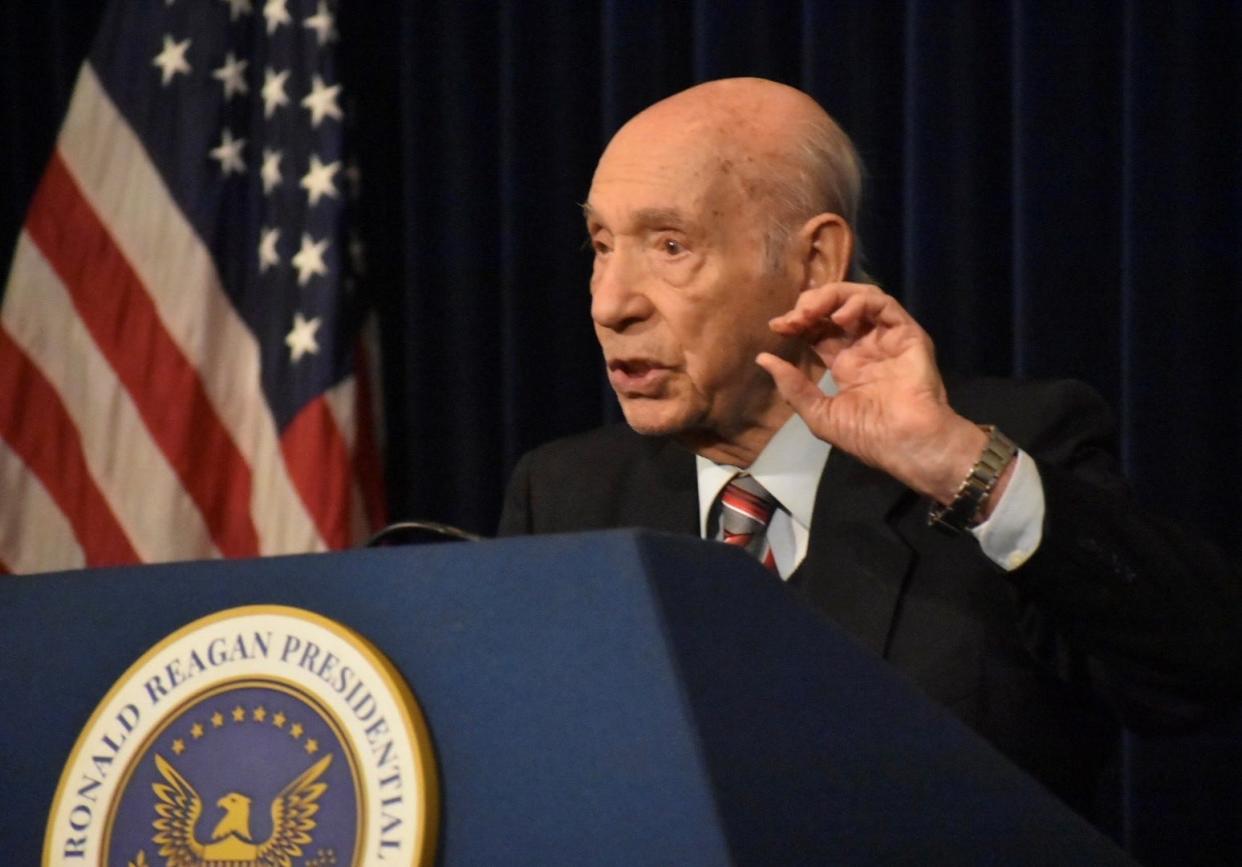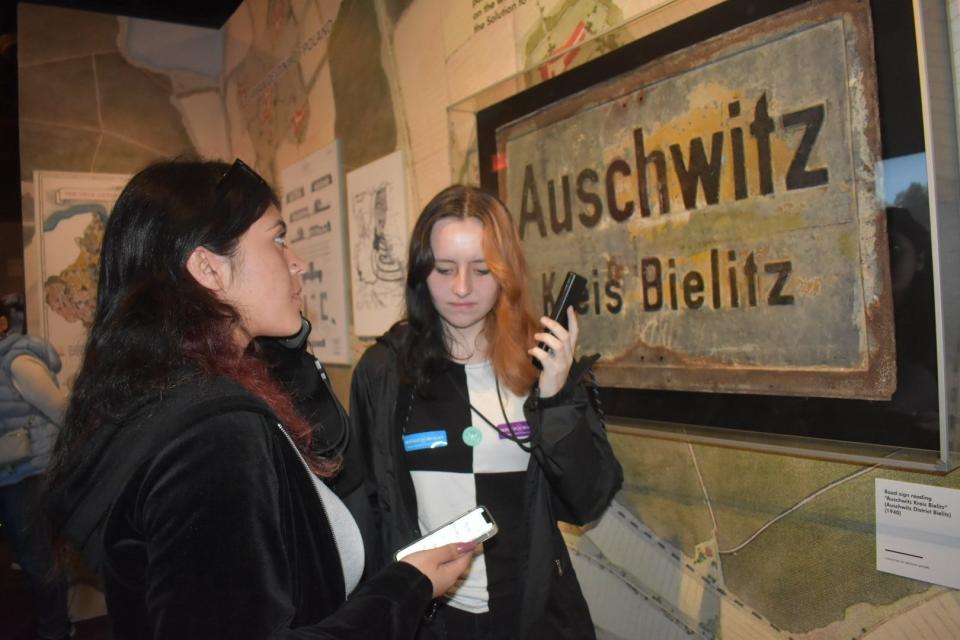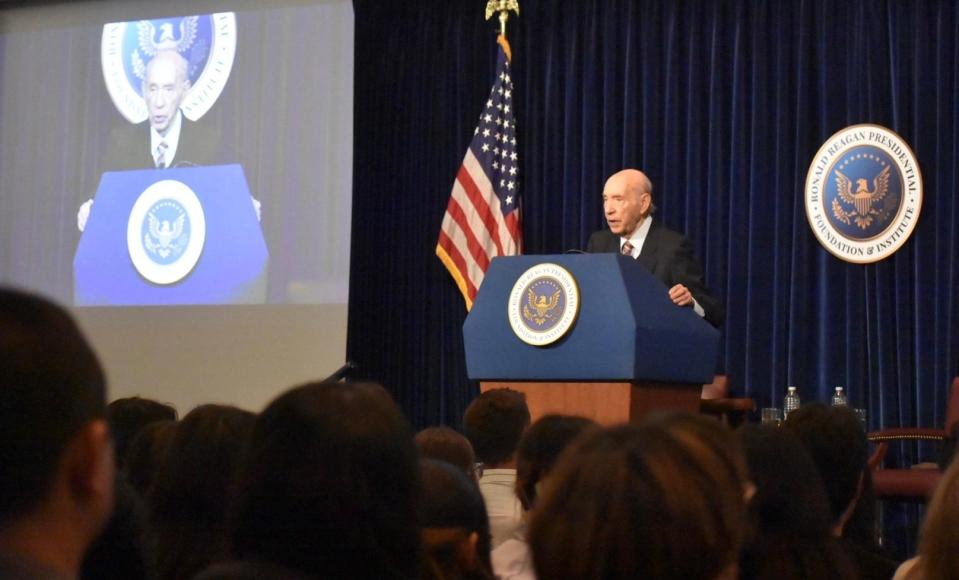Auschwitz survivor tells 1,000 students of horrors 'that can never be erased'

David Lenga was riding on a streetcar in Poland, running an errand for his parents when the Holocaust began in September 1939. He was 11.
Sirens blared. German attack planes flew low, strafing the city of Lodz in the blitzkrieg that started World War II and the genocide that killed 6 million Jews.
“A river of blood appeared in front of me,” Lenga said. The planes destroyed nearly everything and everyone in the line of fire. Those still standing ran for cover.
“The entire scene was a slaughterhouse,” he said. “This is a picture that can never be erased from my memory.”
The 95-year-old Woodland Hills man gripped the sides of a podium at the Ronald Reagan Presidential Library & Museum in Simi Valley on Monday, speaking to an audience of 1,000 students from Ventura County and beyond. The students were there on the Holocaust Remembrance Day of Yom HaShoah to tour the world-renowned Holocaust exhibit that opened last month, “Auschwitz. Not long ago. Not far away.”
They listened, some in rapt attention, as Lenga explained there were 100 people in his extended family before the Holocaust. Only he and his father survived.
When he learned his mother was gone, the grief was endless. Life seemed pointless.
“I wanted to end it all,” he said.
'How do I survive?'
But he kept on. He was enslaved in a Jewish ghetto in Poland, living in near starvation and surrounded by death. He and others were forced to work in a factory making leather goods for the Nazis. Ultimately, he was taken in a cattle car to Auschwitz squeezed against the other Jews “like sardines.”
Auschwitz was the largest and most lethal concentration camp. Lenga knew he could be the next to die. He escaped by hiding on a train taking able-bodied people to a labor site that turned out to be Dachau concentration camp in Germany. He realized his place on the train meant someone else lost their spot and stayed at the death camp.

“I didn’t have any pity in my heart for this man,” he said, noting that the horrors desensitized even the victims. “All we could think of was, 'How do I survive the next moment.' ”
For six years, he lived in starvation and fear, watching people around him killed, never knowing if he would be next. His identity as a human was stripped away, replaced by a number.
There was no hope. He told the students the real horror comes in knowing his story was not just his story.
“You need to multiply it 6 million times to realize the depth of the tragedy,” he said.
Other nations took far too long to react to the genocide, he said.
“The world at large was silent in the face of the Holocaust. They knew exactly what was happening,” he said. The lesson is to take action — never think for a moment the inhumanity will go away on its own.
“You are inviting evil to flourish. Don’t ever forget that,” he said.
Feeling grief
Logan Burns, a 10th-grader from La Reina High School in Thousand Oaks, sat in the front row jotting down Lenga’s words. She said her takeaway is not to be a bystander.
“It’s standing up for yourself and what you know is right,” she said.

The students toured the exhibit of more than 700 artifacts from Auschwitz and other sites. They looked at the prayer shawl worn by a man killed at the concentration camp, the gas mask used by the Nazis, parts of the barracks from Auschwitz and a model of the device used to flood execution rooms with gas.
Some of them thought of the perseverance of the survivors. Liah Kupinsky, who is Jewish and a 12th-grader at Monte Vista School in Simi Valley, struggled to articulate her emotions.
“I feel grief,” she said finally. “I feel sinking.”
The end of the war was harrowing, too. Lenga was being transported again when American planes mistook the train for a military vehicle and bombed it. Lenga and others jumped from the train. The Nazis who survived the attack fled the scene, knowing the war was almost over and they had lost.
Lenga ended up at a safe haven, a farm in the Bavarian region of Germany. He learned the war was over when he was liberated by Black American troops.
Deciding he couldn’t let the darkness of the Holocaust control his future, he moved to Sweden where he found the “love of my life.” They raised a family and immigrated to the United States. A tailor during the Holocaust, Lenga designed clothes for a clientele that included many Hollywood celebrities. He later worked in real estate.
He has toured the Auschwitz exhibit and, in an interview after his speech, worried far too many youth don’t know, or don’t understand the horrors it represents.
“If you don’t know your past, you’ll repeat it,” he said, contending denial of what happened should be criminal. He advocated compulsory Holocaust education, asserting knowledge is the only path forward. The belief is why he tells his story.
“If you have an educated populace, you assure this will never happen again,” he said.
For information on the exhibit, go to https://www.reaganfoundation.org/.
Tom Kisken covers health care and other news for the Ventura County Star. Reach him at tom.kisken@vcstar.com or 805-437-0255.
SUPPORT LOCAL JOURNALISM: To see more stories like this, subscribe here.
This article originally appeared on Ventura County Star: Survivor remembers the horrors of Auschwitz in Reagan library event

